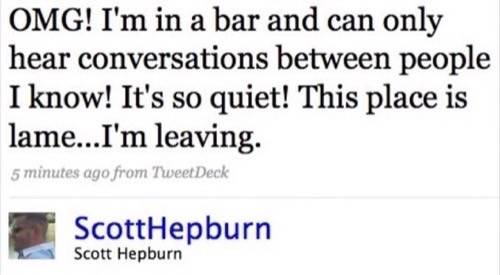It’s not exactly a silent spring, but a change made to Twitter’s settings this afternoon has already greatly reduced the tweets its users are witness to. In what the company called a small settings update, users no longer see public replies sent by friends to people they themselves are not following. (Fragmented conversations, they are called.) This isn’t a small change at all; it’s big, and it’s bad. The new setting eliminates serendipitous social discovery.

Are you familiar with The Onion’s biting political commentator Baratunde Thurston, cyborg anthropologist Amber Case or Google’s Kevin Marks? If not, that’s too bad – they are all really interesting people I talk with a lot on Twitter. If you’re not following them, though, you’ll never discover them through my public conversations again. As far as you’re concerned, those conversations just silently disappeared.
Update: For the latest in our ongoing coverage of this story, see this speculation about the technical explanation for why Twitter made this change.
Update again: In less than 24 hours, Twitter has changed this policy. Click here to read how.

Above: I get @hamsandwich’s messages, but I won’t get the one where he discusses what @japanther is doing. @japanther is, like, dead to me.
The new policy isn’t something you have to opt-in to. It’s not something you can opt-out of. It’s true for people who use 3rd-party Twitter clients to read their Tweets. It’s more fundamentally closed than Facebook is; on that site I may not be able to view the profiles of strangers talking to my friends, but I can see that the conversations are happening and I can read the comments. This new Twitter policy breaks one of the fundamental rules of social activity streams: that I can discover new people by seeing who is conversing with the people I already know.
It’s crazy. Imagine the new users who are only following celebrities. Who will they be exposed to in this quieter new stream?
Information overload is a problem that people complain about a lot, but that’s how Twitter works. There has to be some other way to deal with complaints about “stranger replies.” Perhaps it’s a tab or setting, but this silent hiding of public conversations your friends are having risks removing some of the most magical parts of Twitter. I love discovering new people through the people I already know. I found out about this policy through a Tweet from the New York Times’ Patrick LaForge, who always Tweets about interesting things. Too bad I’ll never hear about his friends again.
There’s no way this is going to last. I’m in shock that the policy was put in place at all.
Update: Just after we put this post up, the Twitter blog post was revised to include the following:
“Spotting new folks in tweets is an interesting way to check out new profiles and find new people to follow. Despite this update, you’ll still see mentions or references linking to people you don’t follow. For example, you’ll continue to see, “Ev meeting with @biz about work stuff” even if you don’t follow @biz. We’ll be introducing better ways to discover and follow interesting accounts as we release more features in this space.”

Our response? While recommendations are interesting, I’d like to use my own judgment in deciding who’s interesting enough to follow. The people that individual friends of mine are conversing with is one of the best ways to do that.
Update: Reader “Michael” left the most thorough and helpful comment in defense of this new policy that we’ve seen, below. It’s worth reading.

Act now while you still can. You can find ReadWriteWeb on Twitter, as well as the entire RWW Team: Marshall Kirkpatrick, Bernard Lunn, Alex Iskold, Sarah Perez, Frederic Lardinois, Rick Turoczy, Sean Ammirati, Lidija Davis, Jolie Odell and Phil Glockner.

















